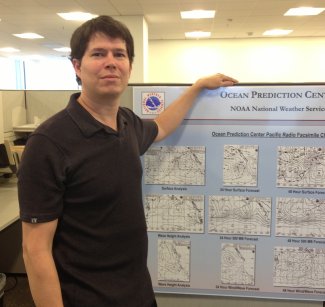| Hurricane Warnings in Effect | Pacific: High Seas EP1 and EPI |
Get to Know OPC - Paul Lee
 Paul Lee
Paul Lee
Marine Forecaster
Ocean Forecast Branch
Ocean Prediction Center
What is your title and what are your duties?
Marine Forecaster; I issue wind, freezing spray and volcanic ash warnings (advisories) for the High Seas areas of the Atlantic and Pacific Oceans. I also analyze surface weather for these regions.
What first got you interested in weather?
Well, when I was a toddler, I remember seeing thunderstorms and waterspouts on Tampa Bay. Later, during elementary and middle school years, I lived in San Antonio. I looked forward to the supercell thunderstorms that would develop in that part of the country during springtime. I remember staying up all night to look at the radar (when there was no school the next day of course).
Where did you attend college?
Associate's – Florida Community College at Jacksonville
Bachelor's – University of Miami
Master's – Mississippi State
Did you participate in internship(s), and if so, how did it help you land a position in meteorology?
Not exactly, but I was on an ROTC scholarship for my undergraduate degree. Upon graduating, I was commissioned into the US Air Force as a Weather Officer. I served eight years in the Air Force before joining the National Weather Service. My career in the Air Force took me on tours in Germany, the Pentagon and Guam where I routinely forecasted weather for much of Europe, Africa and the Middle East as well as Micronesia and SE Asia. I provided routine weather briefing support to General Officers at the Pentagon and in Guam. During these tours I also became a certified Weather Observer and Flight Weather Briefer and was certified in Flight Weather Hazards (Low-level and upper-level turbulence and icing) chart production. Oh, and I did do a brief stint at the Hurricane Research Division during college.How long have you worked for the National Weather Service and the Ocean Prediction Center?
Five years for the National Weather Service, my entry level position was a GS-12 when I left the US Air Force as a Captain. I've been at the OPC since Dec 2009. I applied to the job while I was at the National Weather Service in Guam. I was essentially hired soon after the phone interview.What's the most difficult thing about being a Meteorologist, or your least favorite aspect of the job?
Since weather systems are never alike, every forecast is a new one. I'd say applying past experience to an upcoming forecast and being able to "massage" the various model guidance into the new forecast is pretty tough. My least favorite aspect though? Shift work – not being able to roam from the work station for more than a couple minutes, for example, to drive to get a meal.What's one of the best things you like about being a Meteorologist?
The satisfaction of nailing a forecast, especially after siding with an outlying model solution that one may otherwise discard from guidance.When you leave work, after you shift, do you still find yourself checking the weather from home?
Yes, I do, especially if there is severe weather, a snowstorm, etc. bearing down on my area.Personally do you have an exciting weather story to share?
The day before I was scheduled to take off to the Plains for a couple weeks of storm chasing there was a severe weather outbreak in South Florida. I had known this ahead of time and had my NOAA weather radio on. Low and behold, the radio alerted. It happened to be a tornado warning for a storm over downtown Miami. I watched the storm from my high-rise condo a couple miles away. Within a few minutes a nice large tornado dropped from the wall cloud. It turned out to be an EF-2 and the best tornado I saw over the next couple weeks. Oh, the irony.View all stories in "Get to Know OPC"


